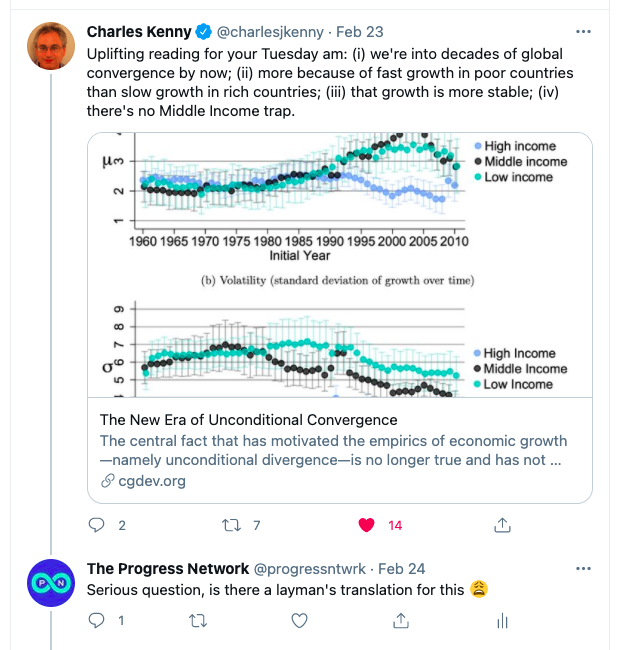Volcanoes are erupting in The Philippines, but on-fire Australia received some welcome rain. The Iran war cries have been called off and The Donald’s military powers are about to be hamstrung by the Senate. Meanwhile, his impeachment trial is starting, and we’re all on Twitter for a front-row seat.
A Very Habitable Earth
What the CDC messed up, why you as an individual didn't have a year shaved off your life, and several positive climate trends to look forward to.
This is an extract from our now-weekly newsletter, What Could Go Right? Sign up here to receive it in your inbox every Thursday at 6am. You can read the full newsletter here.
You likely saw the CDC finding, which got a ton of play in the media a couple weeks ago, that the pandemic has led to a full-year drop in life expectancy. Just one more thing to add to our long list of pandemic horrors, right?
The problem is, the CDC’s math lies on a faulty assumption—“that for the year you are studying, the risk of death, in every age group, will stay as it was in that year for everyone born during it,” says Stat News. Obviously the pandemic conditions of 2020, which has led to unusually large losses of life, are not going to stay that way. So that one-year drop? Stat News recalculated: try less than a week.
It’s a point worth making anytime, but especially these days since so many people’s sanity is teetering on the brink (or has already fallen over it). As well as since life expectancy headlines are often understood not as a projection that is revised every year, but as a statement that you as an individual are more likely to die a full year earlier than you were before. If that is what you’ve been thinking, it’s not the case.
One thing we get asked a lot about here at The Progress Network is how we could possibly have anything “positive” to say about climate change. (If you’re prone to despairing over our environmental future, consider joining our conversation next week that pushes back on the climate catastrophism narrative.)
Actually, there are several positive climate trends, and we wanted to list a few private sector ones in particular. Carmakers have announced near-future plans to go fully electric, and now the air travel industry is following their lead. We’re looking at one-to-two decades before all-electric planes are a possibility, but hybrids, especially for short-haul flights, can be available in just a few years. Shipping, too, is changing. Maersk, the biggest container shipping company in the world, will have all carbon-neutral ships by 2023.
Several mainstream outlets, including The Economist and Politico, have covered the death of coal and how quickly things have turned from “not gunna happen” to “well, that’s some progress.” The Economist reported in December that global use of coal will likely never surpass its pre-pandemic peak. And two days ago Politico’s The Long Game newsletter followed up on coal’s collapse: “When the Sierra Club launched its Beyond Coal campaign in 2010, people laughed at its goal of a coal-free power sector by 2030,” they wrote. “Nobody’s laughing now that 339 of America’s 530 coal plants have been retired or scheduled for retirement.”
Last but not least re: climate, we’re back on track to healing the ozone layer, thanks to some quick work from China.
One last bit on vaccines before we go. President Biden just announced that we’ll have enough supply to vaccinate all Americans by May, two months earlier than the previous schedule. Several countries, including the US, joined the ACT-Accelerator partnership that will make vaccines and tests more readily available globally, and Ghana became the first country in Africa to receive vaccine doses through COVAX. There was a very exciting announcement that a “promising blueprint for a malaria vaccine” has been developed using new RNA technology from the COVID vaccine. If it works, it could save hundreds of thousands of lives.

Luckily for those of us whose eyes cross looking at graphs like these, Charles Kenny answered us: “Poor countries are growing faster than rich countries and have been since the 1990s. That means global inequality is declining—a reverse of about a century or more of growing global inequality.” Nice.
From us: The federal minimum wage has been stuck at $7.25 since 2009. But there has been a good deal of momentum on both sides of the aisle around raising it lately. Check out Progress in 5 Minutes: The Federal Minimum Wage Push, on how we got here, how to move forward, and how the US compares to the rest of the world (badly, sorry).
Have reports of inevitable planetary doom been exaggerated? Join us next week for Maybe We’re Not F*cked, a conversation with Ted Nordhaus, cofounder of The Breakthrough Institute, and Bina Venkataraman, former senior climate change advisor in the Obama White House, for an unusually uplifting climate conversation.
Did you miss our event on the future of cities post-pandemic? You can watch the recording or read an extract from the conversation here.


